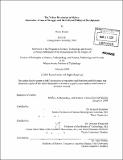| dc.contributor.advisor | Kenneth Keniston. | en_US |
| dc.contributor.author | Kumar, Richa, Ph. D. Massachusetts Institute of Technology | en_US |
| dc.contributor.other | Massachusetts Institute of Technology. Program in Science, Technology and Society. | en_US |
| dc.coverage.spatial | a-ii--- | en_US |
| dc.date.accessioned | 2009-10-01T15:47:44Z | |
| dc.date.available | 2009-10-01T15:47:44Z | |
| dc.date.copyright | 2009 | en_US |
| dc.date.issued | 2009 | en_US |
| dc.identifier.uri | http://hdl.handle.net/1721.1/47825 | |
| dc.description | Thesis (Ph. D. in History, Anthropology, and Science, Technology and Society (HASTS))--Massachusetts Institute of Technology, Program in Science, Technology and Society, 2009. | en_US |
| dc.description | Includes bibliographical references (p. 319-331). | en_US |
| dc.description.abstract | This dissertation engages with two analytical frameworks to explore questions of social transformation and structures of power in rural society in India. The first is a specific critique of various types of development discourse and development projects that have been elaborated by national and international elites during the last forty years, focusing on the dry land Malwa region in the central Indian state of Madhya Pradesh. This includes a project to introduce soyabean cultivation to the region in the 1970s, which has been post-facto labeled as a yellow revolution, and a discourse which argues that providing market information through new information and communication technologies is empowering farmers. I argue that these projects and discourse have mostly steered away from engaging with the structures of power framing rural society, and thus, have failed to bring about much change in the condition of rural people in central India. The second analytical framework is a recovery and foregrounding of alternate arenas of struggle that rural people in the Malwa region have been participating in. The platform of democratic politics is one such avenue that marginalized groups have used to make demands upon the state to provide them with support and allows them to hold the state accountable for the same. Participating in cultural projects that question and subvert the forms of caste and gender based exclusion that frame the lives of people is another such arena which provides women and adivasis (tribals) with a language of empowerment. This research argues that for the language and practice of development to have more relevance to the lives of the poor and for it to engage with the deeper aspirations in their lives, the role of these political and cultural projects as vital platforms for rural people to exercise agency and bring about change, must be recognized. | en_US |
| dc.description.statementofresponsibility | by Richa Kumar. | en_US |
| dc.format.extent | 331 p. | en_US |
| dc.language.iso | eng | en_US |
| dc.publisher | Massachusetts Institute of Technology | en_US |
| dc.rights | M.I.T. theses are protected by
copyright. They may be viewed from this source for any purpose, but
reproduction or distribution in any format is prohibited without written
permission. See provided URL for inquiries about permission. | en_US |
| dc.rights.uri | http://dspace.mit.edu/handle/1721.1/7582 | en_US |
| dc.subject | Program in Science, Technology and Society. | en_US |
| dc.title | The Yellow Revolution in Malwa : alternative arenas of struggle and the cultural politics of development | en_US |
| dc.type | Thesis | en_US |
| dc.description.degree | Ph.D.in History, Anthropology, and Science, Technology and Society (HASTS | en_US |
| dc.contributor.department | Massachusetts Institute of Technology. Program in Science, Technology and Society | |
| dc.identifier.oclc | 429488030 | en_US |
